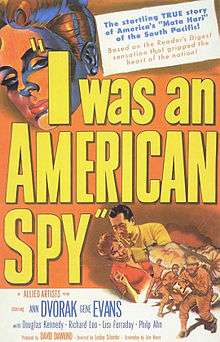I Was an American Spy
| I Was An American Spy | |
|---|---|
 | |
| Directed by | Lesley Selander |
| Produced by | David Diamond, Ben Schwalb |
| Written by | Claire Phillips (novel), Myron B. Goldsmith |
| Starring | Douglas Kennedy |
| Music by | Edward J. Kay |
| Cinematography | Harry Neumann |
| Edited by | Philip Cahn |
Release dates | 1951 |
Running time | 85 minutes |
| Country | United States |
| Language | English |
I Was An American Spy is a 1951 film dramatizing the true story of Claire Phillips, an American of Filipino descent who spied on the Japanese during World War II, and was captured, tortured, and sentenced to death before being rescued. The film, produced by Allied Artists and directed by Lesley Selander, starred Ann Dvorak in the title role.[1] The filmmakers brought Phillips on as a consultant, and she and Dvorak became good friends, with Phillips admiring Dvorak's professional dedication in this difficult role.[1]
Plot
Claire Fuentes is an American-born Filipina living in Manila and working as a cafe entertainer on the eve of the attack on Pearl Harbor. She meets and marries an American soldier, Sgt. John Phillips (Douglas Kennedy), and with her husband, witnesses the Japanese invasion of the Philippines during the siege of Bataan. Her husband is captured, and she watches as he is killed by machine gun fire in the Bataan Death March after he defies the order of a cruel Japanese soldier not to drink from typhoid contaminated water. In retaliation, Phillips uses a handgun to shoot and kill a Japanese soldier. She then joins the anti-Japanese resistance, and in order to obtain intelligence to send back to the United States, she opens a nightclub catering to Japanese officers. Phillips is code named "High Pockets" for her habit of stashing items in her brassiere. She successfully passes useful intelligence on to the American forces and the Filipino underground, but is then discovered, imprisoned, and water tortured by the Japanese. Sentenced to death, she is rescued in the nick of time by American soldiers (one of whom is Cpl. John Boone (Gene Evans)) who storm Bilibid Prison, killing the Japanese guards. In 1951, she is awarded the Medal of Freedom on the recommendation of General Douglas MacArthur.
Reception
Unfortunately for the studio, the relatively low-budget film fell flat with critics, with The New York Times writing that it "isn't especially stimulating either as a narrative or as a tribute to personal courage."[1] Hal Erickson noted in AllMovie, however, that the film "handles its more brutal scenes with a marked degree of tastefulness".[2]
References
External links
- I Was an American Spy at the Internet Movie Database
- I Was an American Spy at the TCM Movie Database